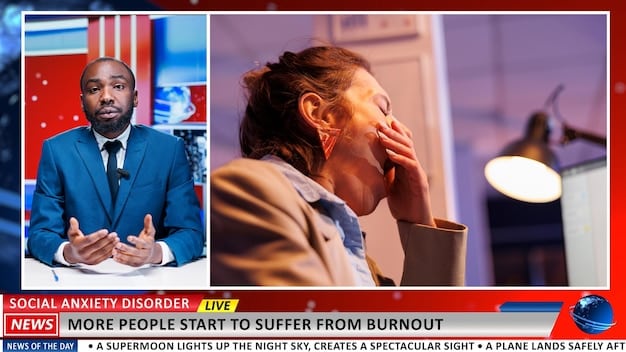US & WHO: Current Status, Future Role & Global Health Impact

The US and the World Health Organization maintain a complex relationship, marked by periods of both strong support and significant tension, impacting global health governance and initiatives.
The relationship between the US and the World Health Organization: What’s the Current Status and Future Outlook? is a crucial determinant of global health initiatives, particularly in light of recent shifts and emerging challenges.
The US-WHO Relationship: A Historical Overview
The United States has been a long-standing and significant contributor to the World Health Organization (WHO) since its inception. Understanding the historical context is crucial to grasping the complexities of the present-day relationship. This section explores the evolution of this partnership, highlighting key moments of collaboration and divergence.
Early Years of Collaboration
The US played a vital role in the establishment of the WHO in 1948, recognizing the need for international cooperation in addressing global health challenges. This early collaboration set the stage for decades of partnership.
From funding research initiatives to supporting disease eradication programs, the US was a key player in shaping the WHO’s agenda and impact on global health.
- The US provided substantial financial contributions, enabling the WHO to expand its operations and reach.
- American scientists and public health experts actively participated in WHO programs, sharing knowledge and expertise.
- Joint initiatives targeted diseases such as polio and smallpox, achieving significant milestones in global health.
The US and the WHO initially maintained a strong collaborative relationship, working together on various global health initiatives and research endeavors.

Periods of Tension and Realignment
Despite the longstanding collaboration, the US-WHO relationship has faced periods of tension. These fluctuations often reflected shifts in US foreign policy, domestic politics, and differing priorities concerning global health.
During certain administrations, disagreements over funding, policy direction, and perceived inefficiencies within the WHO led to reduced US engagement and occasional criticism.
- Concerns about the WHO’s governance structure and decision-making processes sometimes fueled skepticism in the US.
- Debates over the WHO’s handling of specific health crises, such as outbreaks of infectious diseases, occasionally led to disagreements.
- Changes in US leadership often resulted in shifts in the level of support and engagement with the WHO.
Despite these challenges, the US ultimately recognized the importance of maintaining a working relationship with the WHO, given its central role in global health governance.
In conclusion, the US-WHO relationship has historically been strong but not without its challenges, characterized by collaboration and periods of tension.
The Trump Administration’s Withdrawal
One of the most significant events in the recent history of the US-WHO relationship was the decision by the Trump administration to withdraw from the organization. This section delves into the reasons behind this decision and its implications for global health.
Reasons for Withdrawal
In 2020, the Trump administration announced its intention to withdraw the US from the WHO, citing concerns about the organization’s alleged bias toward China and its handling of the COVID-19 pandemic.
The administration accused the WHO of failing to adequately investigate the origins of the virus and of being too deferential to China’s initial response.
- The US government argued that the WHO had not been transparent in its assessment of the situation in Wuhan, where the virus first emerged.
- Criticism focused on the WHO’s initial reluctance to declare a global health emergency and its praise of China’s response.
- The Trump administration also pointed to broader concerns about the WHO’s governance and accountability.
The withdrawal decision was met with widespread criticism from public health experts and international leaders, who warned of the negative consequences for global health security.
Implications for Global Health
The US withdrawal from the WHO had significant implications for global health, both in terms of funding and leadership. The US had been the WHO’s largest single contributor, providing substantial financial support for its programs.
The withdrawal threatened to disrupt the WHO’s ability to respond to global health crises, conduct research, and support health systems in low- and middle-income countries.
- The loss of US funding jeopardized programs targeting infectious diseases such as HIV/AIDS, tuberculosis, and malaria.
- The withdrawal undermined the WHO’s ability to coordinate international responses to health emergencies.
- The US departure weakened the WHO’s authority and influence in global health governance.
The US’s decision to withdraw from the WHO during the pandemic was perceived as a setback to global health security, cooperation, and the fight against infectious diseases.
In conclusion, the Trump administration’s withdrawal from the WHO stemmed from concerns over bias and pandemic handling, posing significant threats to global health funding and leadership.

Rejoining the WHO: The Biden Administration’s Decision
Upon taking office in January 2021, President Joe Biden reversed the Trump administration’s decision and rejoined the WHO. This section explores the reasons behind this move and its significance for the US and the world.
Reasons for Rejoining
President Biden made rejoining the WHO a top priority, emphasizing the importance of international cooperation in addressing global health challenges. This decision was rooted in the belief that the US can more effectively advance its health interests by working with the WHO.
The Biden administration recognized that global health threats, such as pandemics and emerging infectious diseases, require coordinated international action.
- Rejoining the WHO was seen as a way to strengthen global health security and improve the world’s ability to prevent and respond to pandemics.
- The Biden administration emphasized the need for the US to regain its leadership role in global health.
- Re-engagement with the WHO aligned with the administration’s broader commitment to multilateralism and international cooperation.
The decision to rejoin the WHO was widely welcomed by public health experts and international leaders, who praised it as a crucial step toward strengthening global health security.
Impact of Rejoining
The US’s return to the WHO has had a significant positive impact on global health. It has restored critical funding, strengthened the organization’s leadership, and bolstered international cooperation.
The US has resumed its role as a major contributor to the WHO, providing financial support for its programs and expertise to its technical initiatives.
- US funding has helped to support the WHO’s efforts to combat COVID-19, distribute vaccines, and strengthen health systems in low- and middle-income countries.
- American scientists and public health experts are once again actively engaged in WHO programs, sharing knowledge and expertise.
- The US has played a key role in shaping the WHO’s agenda and priorities, advocating for reforms to improve its transparency, accountability, and effectiveness.
Returning to the WHO has allowed the US and the World Health Organization: What’s the Current Status and Future Outlook? to work together more effectively to address global health challenges.
In conclusion, the Biden administration’s decision to rejoin the WHO underscored the importance of international collaboration in addressing global health challenges, restoring funding, strengthening leadership, and bolstering cooperation.
Current Status of the US-WHO Relationship
As of 2023, the US and the WHO have re-established a strong working relationship. This section provides an overview of the current status of this partnership, highlighting key areas of collaboration and ongoing challenges.
Areas of Collaboration
The US and the WHO are currently collaborating on a wide range of global health initiatives. These include efforts to combat COVID-19, strengthen global health security, and address other pressing health challenges.
The US is providing financial support to the WHO’s COVID-19 response, including efforts to distribute vaccines, improve testing and treatment, and strengthen health systems.
- The US is also working with the WHO to develop and implement strategies to prevent and respond to future pandemics.
- Collaboration extends to addressing other global health challenges, such as HIV/AIDS, tuberculosis, malaria, and non-communicable diseases.
- The US and the WHO are also working together to promote global health security, strengthen health systems, and improve access to healthcare.
This close cooperation enables both partners to more effectively address global health challenges, reinforcing their shared commitment to global well-being.
Ongoing Challenges
Despite the strong working relationship, several challenges remain. These include ensuring sustainable funding for the WHO, addressing concerns about its governance and accountability, and navigating political differences.
Sustaining US funding for the WHO is crucial. Shifts in political administrations can influence the level of commitment and financial support.
- Addressing concerns about the WHO’s governance and accountability is also essential to maintaining trust and confidence.
- Political differences between member states can sometimes hinder the WHO’s ability to address global health challenges effectively.
Overcoming these challenges will require sustained commitment from the US and other member states, as well as ongoing efforts to strengthen the WHO’s governance, accountability, and effectiveness.
In conclusion, the US and the WHO are deeply engaged in collaborative health initiatives, sustained by strong working relationships and challenged by issues of funding, governance, and political differences.
Future Outlook for the US-WHO Relationship
The future of the US-WHO relationship will likely depend on several factors, including evolving global health challenges, shifts in US foreign policy, and efforts to strengthen the WHO’s governance and effectiveness. This section explores potential future scenarios.
Potential Scenarios
Several potential scenarios could shape the future of the US-WHO relationship. These include continued close collaboration, periodic tensions, and renewed efforts to strengthen the organization.
Under a scenario of continued close collaboration, the US and the WHO would continue to work together on various global health initiatives, with strong US financial support and engagement.
- Periodic tensions could arise due to policy disagreements, funding disputes, or concerns about the WHO’s governance.
- Renewed efforts to strengthen the WHO could involve reforms to improve its transparency, accountability, and effectiveness.
These scenarios highlight the dynamic nature of the US-WHO relationship. Adaptability and cooperation will be essential for navigating future health challenges.
Recommendations for Strengthening the Relationship
To strengthen the US-WHO relationship, several recommendations can be considered. These include ensuring sustainable funding, strengthening governance, and promoting transparency and accountability.
Ensuring sustainable funding for the WHO is essential for supporting its programs and initiatives. This could involve exploring innovative financing mechanisms and increasing contributions from member states.
- Strengthening the WHO’s governance structure is also crucial. Reforms could include improving the selection process for leadership positions and enhancing the participation of member states in decision-making.
- Promoting transparency and accountability within the WHO is vital for building trust and confidence. This could involve enhancing the organization’s reporting mechanisms and strengthening its oversight functions.
By implementing these recommendations, the US and other member states can help to strengthen the WHO and ensure its effectiveness in addressing global health challenges.
In conclusion, the future of the US and the World Health Organization: What’s the Current Status and Future Outlook? hinges on factors like global health challenges, shifts in US policy, and proactive efforts to bolster the organization’s governance and effectiveness.
The Role of the US in Global Health Governance
The United States plays a significant role in global health governance, shaping policies, providing financial support, and influencing the direction of international health initiatives. This section explores the US’s broader role in global health.
US Contributions to Global Health
The US is one of the largest contributors to global health, providing financial support, technical expertise, and leadership on a wide range of health issues. This commitment reflects the US’s recognition of the importance of global health security and well-being.
Financial support from the US has helped to fund programs targeting infectious diseases, strengthening health systems, and promoting access to healthcare in low- and middle-income countries.
- The US has also played a key role in developing and implementing global health policies, working through multilateral organizations such as the WHO.
- American scientists, public health experts, and policymakers have contributed their expertise to global health initiatives, shaping the direction of research, prevention, and treatment efforts.
The United States’ deep involvement ensures it remains a central figure in shaping global health outcomes.
Challenges and Opportunities
The US faces several challenges and opportunities in its role in global health governance. These include addressing health disparities, promoting health equity, and strengthening global health security.
Addressing health disparities within the US and around the world is a key challenge. This requires addressing social determinants of health, improving access to healthcare, and promoting health equity.
- Strengthening global health security is also essential. This involves preventing and responding to pandemics, combating antimicrobial resistance, and strengthening health systems.
- Opportunities exist to leverage technology, innovation, and partnerships to improve global health outcomes.
By addressing these challenges and seizing these opportunities, the US can continue to play a leading role in improving the health and well-being of people around the world.
The US can leverage its resources, innovation, and strategic partnerships to drive global health forward.
In conclusion, the US plays a central role in global health through financial support, policy influence, and technical expertise, facing challenges and opportunities to address disparities and bolster global health security.
| Key Aspect | Brief Description |
|---|---|
| 🤝 Historical Ties | Long-standing collaboration with periods of tension. |
| 💔 Trump’s Withdrawal | US withdrawal due to concerns about pandemic handling. |
| 💪 Biden’s Rejoin | Rejoining the WHO to strengthen global health security. |
| 🌍 US Role | Significant financial and policy contributions to global health governance. |
Frequently Asked Questions
▼
The WHO’s primary mission is to act as the directing and coordinating authority on international health within the United Nations system. It leads global efforts to ensure that people worldwide have the opportunity to achieve the highest possible standard of health.
▼
The US contributes to the WHO through assessed contributions (membership dues) and voluntary contributions. The US has historically been one of the largest financial supporters of the WHO, providing funds for various health programs and initiatives.
▼
In 2020, the US announced its intention to withdraw from the WHO, citing concerns about the organization’s alleged bias toward China and its handling of the COVID-19 pandemic. The US government argued that the WHO had not been transparent.
▼
Re-engagement has multiple benefits: strengthening global health security, improving the world’s ability to prevent and respond to pandemics, and allowing the US to regain its leadership role in global health. The US contributes financial support and expertise.
▼
Sustaining US funding is crucial, as shifts in political administrations can influence commitment. Addressing concerns about the WHO’s governance and accountability is essential, as is navigating political differences. Efforts to strengthen the effectiveness are ongoing.
Conclusion
In summary, the relationship between the US and the World Health Organization is a dynamic and complex one, shaped by historical collaboration, political shifts, and evolving global health challenges. While periods of tension have occurred, the importance of this partnership for global health security and well-being remains undeniable. Moving forward, sustained commitment, transparency, and cooperation will be essential for strengthening this relationship and ensuring a healthier future for all.





